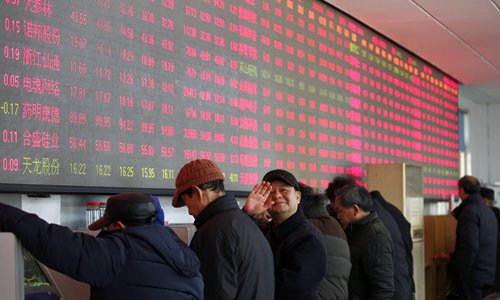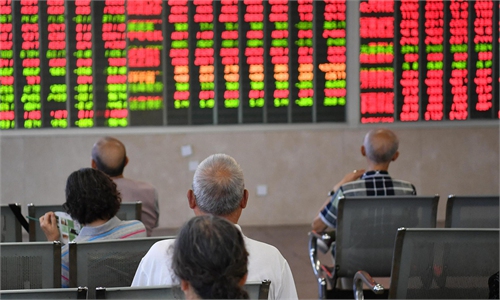
Individual investors watch market performance at a brokerage in Shanghai on Monday. Photo: Yang Hui/GT
Overseas investors are taking advantage of the A-share volatility to buy up Chinese stocks. The northbound trading through the Shanghai-Hong Kong and Shenzhen-Hong Kong stock connects on Tuesday saw a net capital inflow into the A-share market for the fifth consecutive trading session, marking the longest streak since the end of April.
The continuous net capital inflow came on the heels of a heavy sell-off in the mainland stock market last week. The benchmark Shanghai Composite Index dropped 4.77 percent on Monday and Tuesday last week, while the CSI 300 Index fell by 6.6 percent over the two days.
At a time when the increased regulatory scrutiny over several economic sectors has sent jitters throughout the mainland stock market, net inflows of foreign capital could be seen as definitive proof that foreign investors are still bullish on Chinese financial markets and are always tracking the market for buying opportunities.
While some Western media outlets have overplayed China's regulatory moves as the deepening financial decoupling between China and the US, the real situation is not as serious as they claim given the growing appeal of Chinese financial assets to US capital.
In particular, the consistently supportive attitude of Chinese regulators toward financial opening is sufficient to offer overseas investors steady expectations of the market environment in the long run. Over the past years, the Chinese government has made great effort to allow greater foreign access to domestic financial markets. China has already scrapped foreign ownership limits in almost all areas of its financial sector and relaxed entry restrictions for foreign financial institutions. In 2019, China scrapped quotas for the dollar-denominated Qualified Foreign Institutional Investor (QFII) program and the yuan-denominated RQFII. As a result, China's absorption of foreign capital has grown rapidly with more and more branches established by foreign institutions in China.
Yet, some US politicians are not pleased by this development and continue to seek to limit US capital from investing in Chinese financial assets through new legislation. Amid the China-US tensions, it is common to see the US government to impose various restrictions on Chinese technology companies' access to US funding, while politicians are pressuring US funds investing in Chinese stocks to force them to change their investment decisions. In May 2020, the Federal Retirement Fund halted the plans to invest the $600 billion Thrift Savings Plan in stocks listed in the Chinese mainland when faced with mounting political pressure, according to media reports.
However, that doesn't weaken the growth potential of Chinese stocks, especially those in emerging industries, which have been attracting more and more foreign investment. Such market attraction cannot be easily reversed by unilateral political forces.



